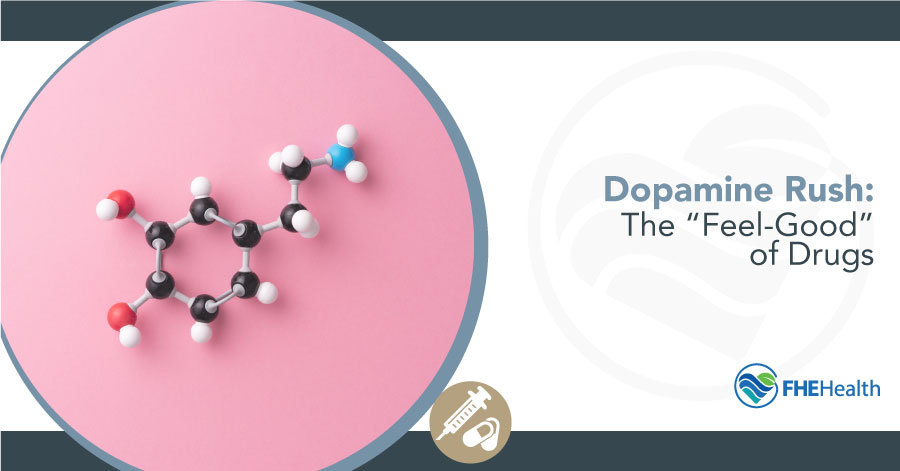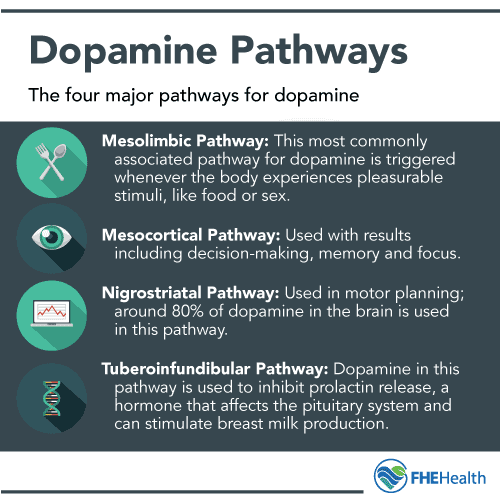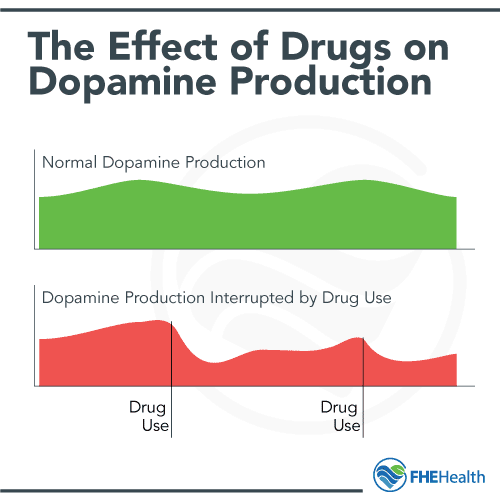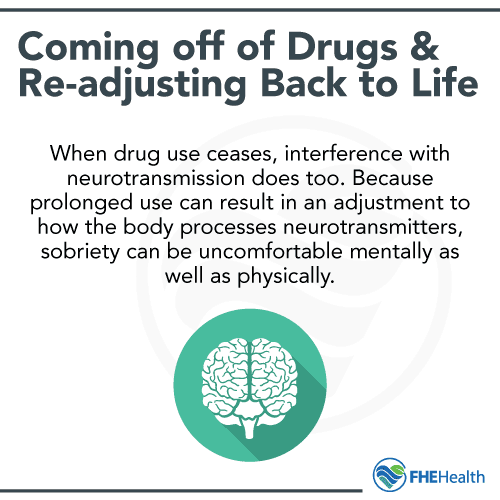
Drugs in many different forms are commonly abused for one distinct reason: They provide pleasure that is often unavailable through organic avenues. While it’s possible to feel pleasurable side effects from things like favorite foods or fun with friends, the high from drugs causes an effect that is rarely duplicable. The cause? Dopamine.
An organic chemical that occurs in the brain, dopamine is considered a “feel-good” substance. The release is triggered when we do enjoyable things; as such, it plays a role in motivating healthy or desirable behavior. However, many drugs can trigger a release in dopamine beyond what occurs normally, resulting in an addictive sensation too pleasing to ignore.
In many ways, dopamine’s role in drug use and abuse is central to addiction.
What Is Dopamine?
 Dopamine is a neurotransmitter made within the body. Neurotransmitters, also known colloquially as chemical messengers, transmit communications between nerve cells. Dopamine is used in four major pathways of the brain:
Dopamine is a neurotransmitter made within the body. Neurotransmitters, also known colloquially as chemical messengers, transmit communications between nerve cells. Dopamine is used in four major pathways of the brain:
- Mesolimbic Pathway: The mesolimbic pathway is most closely associated with what we know as dopamine’s most common function: reward and pleasure. This pathway is triggered whenever the body experiences pleasurable stimuli, like food or sex.
- Mesocortical Pathway: The mesocortical pathway uses dopamine differently, with results including decision-making, memory and focus.
- Nigrostriatal Pathway: The nigrostriatal pathway is involved in motor planning; around 80% of dopamine in the brain is used in this pathway.
- Tuberoinfundibular Pathway: In the tuberoinfundibular pathway, dopamine is used to inhibit prolactin release, a hormone that affects the pituitary system and can stimulate breast milk production.
As indicated above, dopamine plays a vital role in the body that goes far beyond simply invoking pleasurable sensations. Because of the important impact dopamine has many normal functions, it’s easy to infer that the way drugs affect dopamine production and use can actually interfere with other ways in which the body uses this vital neurotransmitter.
How Dopamine Is Normally Released
While dopamine serves several important functions in the body, it’s most noticeable via the mesolimbic pathway. When the brain experiences an enjoyable activity, dopamine is released. In time, these habits can affect dopamine release and regulation; mere anticipation of something fun can be enough to start a rush of feel-good emotion. In this pathway, dopamine isn’t released randomly; it’s the direct result of stimuli or anticipated stimuli.
How Drugs Affect Dopamine
 As most people know, even those who haven’t used drugs, drugs of all kinds, including alcohol, interfere with neurotransmission. When the brain doesn’t function as normal, things like judgment, impulses, thoughts, and feelings change. For example, after a drink or two, many people are more social, bolder and less inhibited than they would be normally.
As most people know, even those who haven’t used drugs, drugs of all kinds, including alcohol, interfere with neurotransmission. When the brain doesn’t function as normal, things like judgment, impulses, thoughts, and feelings change. For example, after a drink or two, many people are more social, bolder and less inhibited than they would be normally.
These are all consequences of disturbances in how neurotransmitters function. Some drugs can function as molecules that bind to receptors in the brain, while others can stimulate increased neurotransmitter production.
However, the brain has a threshold, so to speak, related to neurotransmitters like dopamine. When more neurotransmitters are produced artificially, for example, through the use of drugs, the body doesn’t see the need to keep providing these kinds of responses naturally. As such, it’s not uncommon for normal dopamine production to drop.
This means that responses to previously enjoyable activities — watching a favorite sports team, for example — drop, either slightly or significantly, based on the extent of drug use. When this occurs, substance users begin to feel as though the only thing that can trigger feelings of pleasure and happiness is using drugs.
Changes to dopamine production and reception in the brain can differ from person to person. However, the effects of drug use on dopamine production and use are very common. This increased pleasure is a primary driver behind addiction, keeping people locked in a cycle of abuse, chasing that rush of euphoria over and over again.
Dopamine affects people differently, too, so doses or repeated behavior that causes rapid addiction in one person may not affect another. Some people are simply more susceptible to addiction, and the sensations involving dopamine and other elements of the body’s reward system can play a role in this.
The Dopamine Debate
How drugs specifically affect dopamine levels in the body isn’t wholly understood. Some scientists believe that euphoria is driven by the stimulation of increased production. However, other research indicates that part of the role of dopamine may also have to do with the anticipation of the high from drugs as much as the drugs themselves.
In reality, it may be a combination of these things — euphoric feelings due to dopamine released during drug use as well as an increased rush due to the anticipation of drug use. In conjunction, this can be a dangerous combination that can facilitate an increased likelihood of ongoing addiction.
How Understanding Dopamine Can Inform Addiction
 For those living with an active addiction, the consistent flood of dopamine throughout the body can play a huge role in continued use. When drug use ceases, interference with neurotransmission does too. Because prolonged use can result in an adjustment to how the body processes neurotransmitters, sobriety can be uncomfortable mentally as well as physically.
For those living with an active addiction, the consistent flood of dopamine throughout the body can play a huge role in continued use. When drug use ceases, interference with neurotransmission does too. Because prolonged use can result in an adjustment to how the body processes neurotransmitters, sobriety can be uncomfortable mentally as well as physically.
For those used to increased levels of dopamine, a lack of access to drugs can result in feelings of depression, anxiety, and apathy. Because the body has changed how it naturally produces neurotransmitters like dopamine, recalibration can take weeks or even months after the cessation of drug use.
For those without education in brain chemistry, overcoming withdrawal can feel like a never-ending process that results in permanent misery. Activities that used to be pleasurable before drug addiction seem like they no longer are. However, this isn’t true. In most cases, the body returns to normal production; it’s just a matter of getting clean and riding out the cravings and physical changes that come with withdrawal.
Helping people overcoming an addiction to understand the role of brain chemistry in the development of substance use disorders can be very beneficial. By reassuring someone that they’re not broken or ruined because of addiction — two very common feelings in recovery — and that hope is on the horizon, it’s easier for them to find meaning in staying sober.
If you or someone you love is living with addiction, FHE Health can help. As a comprehensive step-down treatment service overseen by trained medical professionals, we can address addiction from the inside out, including understanding and addressing the physical changes to the brain. From counselors to talk through the recovery process to medical support throughout withdrawal, we help those living with substance use disorders to make it safely to the other side.






